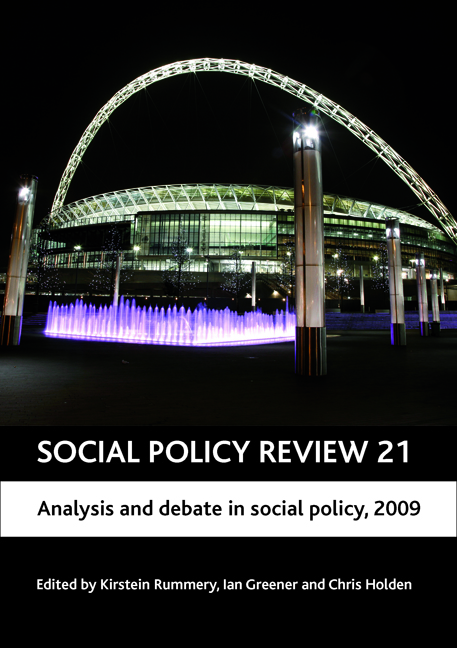six - The Poor Law Commission of 1905–09: a view from a century on
Published online by Cambridge University Press: 05 July 2022
Summary
Introduction
On 1 January 1908, the total number of persons in receipt of some form of poor relief in England and Wales was 928,671: ‘one out of every 44 persons was a pauper’ (Poor Law Commission, 1909a, vol 1, p 31). Behind the figures, within a framework amended in 1834 yet retaining local variations in policy, was a world of interaction yielding decisions about the quality of life for the most vulnerable in society. The Royal Commission on the Poor Laws of the time still signifies as a landmark in social policy with its celebrated division over future policy, where Fabian socialism and a moral and idealist analysis collided. This discussion, however, breaks with tradition by excavating the Commission's own evidence on how participants closely involved in the local running and practices of the Edwardian Poor Law themselves perceived and interpreted its operation. A new interpretation of the intellectual environment of the Commission's majority and minority reports is then developed.
There was already pressure for a review when Balfour's Conservative government announced the Commission, on 2 August 1905. Coincidence or not, this was one day after jobless workers rioted in Manchester, confirming doubts that the 1905 Unemployed Workmen Bill was a sufficient response to unemployment (Brown, J., 1971; Brown, K.D., 1971; McBriar, 1987, p 178).
The membership was announced on 4 December. Lord George Hamilton (a retired Conservative government minister) was chairman. The 18 other members were:
• the O’Connor Don (an Irish Catholic government adviser on Ireland);
• Sir Henry Robinson (of the Local Government Board [LGB] for Ireland);
• Charles Booth (social scientist and advocate of old-age pensions);
• Sir Samuel Provis (of the LGB for England);
• F.H. Bentham (chairman of the Bradford board of guardians);
• Dr A.H. Downes (Senior Medical Inspector, LGB for England);
• the Rev. Thory Gage Gardiner (from the settlement movement and the Charity Organisation Society [COS]);
• George Lansbury (socialist, and ‘labour’ guardian at Poplar);
• Charles Stewart Loch (sympathetic to idealist social thought and Secretary to the COS);
• James Patten-MacDougall (of the LGB, Scotland);
• Thomas Hancock Nunn (from the settlement movement and the COS);
• the Rev. Lancelot Ridley Phelps (from the COS, and Fellow of Oriel College, teaching classics and political economics);
• William Smart (economist, University of Glasgow);
• the Rev. Henry Russell Wakefield (London cleric and municipal administrator);
• Helen Bosanquet (writer on social work, an interest shared with her husband, Bernard, an idealist philosopher);
- Type
- Chapter
- Information
- Social Policy Review 21Analysis and Debate in Social Policy, 2009, pp. 109 - 130Publisher: Bristol University PressPrint publication year: 2009

